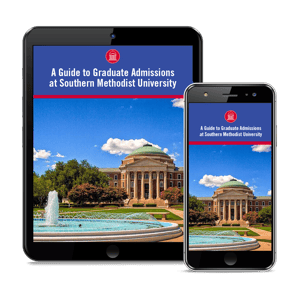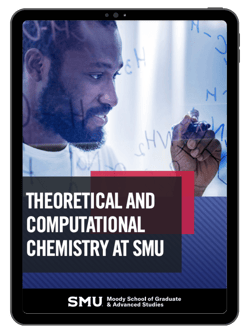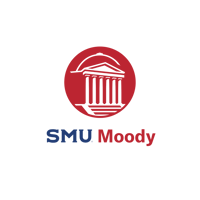Since August 2017, SMU has offered a unique PhD program that provides students a specialized, comprehensive graduate education and degree in the burgeoning field of Theoretical and Computational Chemistry (TCC). It’s based on a comprehensive four-year degree plan that includes:
-
core classes,
-
electives,
-
research,
-
workshops
-
and individual mentoring.
This guide will help you explore interdisciplinary chemistry and get to know the cutting-edge research being conducted in the department at SMU, largely made possible with access to state-of-the-art resources and institutional support. You will also meet our expert faculty and discover what current and former students have to say about their experiences in the program.
Chemistry: The Central Science
Chemistry has long been known as the central science because it bridges the gap between the physical and life sciences, and the applied sciences (like engineering, environmental science and medicine). It is both “the central science” and the most foundational of the sciences since every other field of science relies on chemical insights into the nature of atoms and molecules in order to understand how more complex systems operate.
Learn more about the history of theoretical and computational chemistry.
Chemistry and Key Economic Sectors
Because of its centrality and its role in transformative innovation, Chemistry is at the heart of many key economic sectors. The energy, technology, health and materials sectors all rely on chemical insight to advance, improve and deliver high quality products that support human flourishing. In addition, Chemistry plays a central, if not to say leading, role in initiating, carrying out and supporting developments that help guarantee the sustainability of our world.
The reliance of key economic sectors on chemistry means that there is a significant federal and industry investment in the development of top-notch chemists and significant opportunity for chemists to thrive in the many roles available to them in different fields.
Chemistry and the Human Experience of the World
Chemistry plays a central role in our world. In particular, TCC applies quantum mechanics and molecular modeling, along with modern tools, such as machine learning, to improve our lives and increase sustainability in many important areas:

Development of new drugs to fight cancer, Alzheimer’s, Parkinson’s, Malaria

Design of new catalysts, solar energy collector materials, hydrogen generation, biofuels

Materials and processes for filtering and cleaning water

Development of novel materials, nanotechnology, quantum computing, semiconductor technology, etc.
The Importance of an Interdisciplinary Approach to Chemistry Research
To fulfill its role and meet the requirements of our time, Chemistry has changed and adapted, becoming highly interdisciplinary and multidisciplinary with research topics that reach beyond traditional borders. As a result, the field is largely collaborative, making chemists ideal partners for researchers in medicine, biology, engineering, and environmental sciences.
What Can You Do With a Chemistry PhD?
Chemists who seek jobs in TCC must have more than just a strong knowledge of basic chemistry. They should also be comfortable with various levels of chemistry programming and code development, have a good understanding of theoretical principles and be motivated problem-solvers. Additionally, familiarity with applying computer learning to research and experimental design is important.
A PhD in Chemistry from SMU opens the door for a wide range of career choices in both academia and industry, including government and national laboratories. Some potential career paths for chemistry PhDs include:
-
Consulting
-
Forensic chemistry
-
Government (Research)
-
Industrial research (R&D)
-
IT companies
-
Postsecondary education
-
Product development
-
Tech/biotech start-ups
Understanding the Value of Theoretical and Computational Chemistry
and its Relationship to Traditional Chemistry
What is Theoretical Chemistry?
Theoretical Chemistry is a branch of Chemistry that uses conceptual theories derived from physics and mathematics to explain and generalize the rules that govern all chemical systems and interactions. It involves the development of computational and theoretical methods based on quantum chemistry and mathematical procedures in order to describe the physical properties and the chemical behavior of atoms and molecules.
Theoretical Chemistry comprises several disciplines such as:
-
Quantum Chemistry
-
Molecular Mechanics
-
Statistical Mechanics
-
Nonlinear Thermodynamics
Among these disciplines under Theoretical Chemistry, Quantum Chemistry is by far the most popular field. There are thousands of investigations and research projects carried out every year in this field.
What is Computational Chemistry?
Although the terms Theoretical Chemistry and Computational Chemistry are very often used synonymously, the fields are not identical. Computational Chemistry takes the conceptual framework of Theoretical Chemistry and allows the insights and questions of Theoretical Chemistry to be rigorously tested, modeled, and observed by running programs on high-performance super computers.
Computational Chemistry requires a strong understanding of theory, but also the ability to translate theoretical methods into suitable computer programs so that chemical problems can be solved.
The Partnership Between Traditional and Computational Chemistry
The primary goal of Chemistry is to control chemical reactions with the purpose of generating useful, non-toxic, and non-dangerous materials with desirable properties in an economic way.
Computational Chemistry is a discipline of chemistry that can substantially contribute to all the fields of science as well as the metamorphosis of traditional to modern Chemistry.
Computational chemistry with quantum chemistry, molecular modeling, and molecular dynamics as its major tools has matured and become an important partner of experimental chemistry in the last decades. These computational tools are used to shorten and facilitate chemical discovery processes, avoid costly and/or dangerous experiments, and obtain information not amenable to experiment.
All work of the Department of Chemistry at SMU has as a common goal to understand the electronic structure of molecules so that reliable predictions of their properties and chemical behavior can be made. These predictions become important in all those cases where chemical experiments are not conclusive, too dangerous, too costly or not possible at all.
Computational Chemistry makes advances that are beyond the possibility of traditional chemistry, but relies on input from other branches of science to inform the relevance of its modeling efforts. This is one of the major reasons the Department of Chemistry at SMU emphasizes an interdisciplinary approach to teaching and research.
Exploring Theoretical and Computational
Chemistry Research Topics
The Department of Chemistry’s research at SMU focuses on the large-molecule world, concentrating on biomolecules, engaging in drug design and introducing computational nanotechnology:
- Quantum Chemistry
- Molecular Mechanics
- Molecular Modeling
- Statistical Mechanics
- Nonlinear Thermodynamic
Current Research Interests
- Cracking the second code of life through protein dynamics using artificial intelligence and data science approaches. Deciphering enzyme catalysis and evolution through multi-scale simulations and theoretical framework development. Employing computational methodologies to solve many more real-world chemistry and biology problems. Training a new generation of scientists and workforce with a broad range of problem solving, analytical, and computer programing skills.
- Application of ab initio (meaning “from the beginning”) methods based on quantum mechanics and combining concepts and techniques from chemistry, physics, mathematics, and computer science to use and develop accurate theoretical methods to study molecules, reactions, clusters, and extended systems; active areas include computational spectroscopy (specifically X-ray), computational techniques for tensor contraction and factorization, and development of new theoretical methods.
- Enhance drug design through our novel artificial-intelligence-supported, computer-assisted platform with emphasis on covalent binder and enzyme drugs being described with our automated protein structure analysis software.
SMU: An Ideal Home for Research of this Kind
SMU is a private, highly renowned research institution founded in 1911, committed to academic freedom and inclusivity. Because of our size, we are a community where you can build strong connections to faculty mentors and enjoy an individualized education that fits your research interests and career goals.
Find out what life is really like in a chemistry research-intensive PhD program from a TCC graduate.
High-Performance Computing
SMU excels in Theoretical and Computational Chemistry through a deep partnership with the Center for Research Computing which supports a state-of-the-art research computing infrastructure for SMU faculty and students.
The cornerstone of our computational excellence is SMU’s high-performance computer cluster ManeFrame II which has a total capacity of 930 teraflops.
SMU is investing $11.5 million into a powerful new supercomputing research system featuring an NVIDIA DGX SuperPOD. The successor of ManeFrame II, ManeFrame III, is already in planning and will be launched in the Fall of 2022.
Connected with the NVIDIA Quantum InfiniBand networking platform in SMU's data center, it will produce a theoretical 100 petaflops of computing power enabling the university's network to perform "a blistering 100 quadrillion operations per second.
Premiere Research Environment
The Department of Chemistry is a vibrant, strongly research-oriented unit in Dedman College. Chemistry faculty have secured grants totaling nearly $10 million over the last 10 years, and have been honored with four NSF CAREER awards, an impressive record for a department of this size.
Access to a Thriving and Supportive Graduate Community
SMU’s Moody School of Graduate and Advanced Studies aims to provide opportunities for professional advancement and graduate student engagement through regular workshops and events.
Students are able to find a variety of resources that can assist them at any stage of the doctoral process, whether it is working one-on-one with our Director of Fellowships and Awards to seek external grants for your work or connecting with an on-staff writing center counselor to help you revise your paper. Just as important, students can also meet with other grad students from across campus at monthly social events whenever they need a break from the lab.
Location, Location, Location
Because of our location in Dallas, Texas, we have easy access to a number of diverse industries that are looking for creative and ingenious researchers. Dallas is one of the fastest-growing cities in the United States and is home to several technological and industrial businesses, both established and starting up. Forbes ranks Dallas as #2 in best places for business and careers, meaning there is lots of potential for new jobs as students enter the market.
Our picturesque SMU campus is nestled just north of the bustling downtown area while still maintaining the feel of a small, intimate campus. From great restaurants and shopping to easily accessible public transportation near campus, the Dallas Metro area has a lot to offer graduate students who come here to take the next step in their professional career.
Get the Graduate Student's Guide to Living in Dallas
The First Rigorous Theoretical and Computational PhD Program in the US
Theoretical and Computational Chemistry PhD
Coursework
Students commit to a thorough and intensive full-time, four-year, 66-credit coursework plan that establishes the foundations of theory and computational topics and provides students the flexibility to explore their own innovative research. Teaching practicums and special topics are also incorporated into the curriculum to ensure that students are staying on top of the most recent trends and getting the practical experience necessary to be competitive candidates for both academic and industry jobs after graduation.
Financial Support
In addition to professional support, our department is dedicated to providing substantial financial support that allows students to focus on their studies.
Benefits include an annual stipend of $25,000, full tuition waiver, coverage of health insurance premiums, and a travel allowance for national conferences. Outstanding candidates are also eligible for competitive fellowships provided by the Moody School of Graduate and Advanced Studies and the Center for Research Computing that provide additional financial assistance.
Learn More About the $100 Million Gift from the Moody Foundation
Research
Our department has a uniquely high percentage of theoretical faculty, offering a broad and diverse spectrum of research, and leading to a unique opportunity for the TCC PhD students. We strive to create a vibrant, friendly, and supportive environment where students work on cutting-edge research with one of the four TCC faculty members. Furthermore, interdisciplinary research within the chemistry department and beyond is strongly encouraged.
Advantages in a Competitive Job Market
The demand for a highly trained computational and theoretical chemistry workforce is steadily increasing. The U.S. Bureau of Labor Statistics predicts there will be an annual increase of at least 15% for computational and theoretical chemistry positions until 2025, a faster growth rate than for all other chemistry-related jobs. SMU’s TCC PhD program provides you a pipeline to a wide range of academic and non-academic jobs requiring intellectual leadership and technical excellence. Our graduates are now at research centers such as Pacific Northwest National Labs and companies such as Google and Eli Lilly.
![1200750_[SMU] TCC Guide Update_nonacademic_110321](https://grad.smu.edu/hs-fs/hubfs/1200750_%5BSMU%5D%20TCC%20Guide%20Update_nonacademic_110321.png?width=400&name=1200750_%5BSMU%5D%20TCC%20Guide%20Update_nonacademic_110321.png)
![1200750_[SMU] TCC Guide Update_google_110321](https://grad.smu.edu/hs-fs/hubfs/1200750_%5BSMU%5D%20TCC%20Guide%20Update_google_110321.png?width=102&name=1200750_%5BSMU%5D%20TCC%20Guide%20Update_google_110321.png)
![1200750_[SMU] TCC Guide Update_lilly_110321](https://grad.smu.edu/hs-fs/hubfs/1200750_%5BSMU%5D%20TCC%20Guide%20Update_lilly_110321.png?width=84&name=1200750_%5BSMU%5D%20TCC%20Guide%20Update_lilly_110321.png)
![1200750_[SMU] TCC Guide Update_pacific_110321](https://grad.smu.edu/hs-fs/hubfs/1200750_%5BSMU%5D%20TCC%20Guide%20Update_pacific_110321.png?width=132&name=1200750_%5BSMU%5D%20TCC%20Guide%20Update_pacific_110321.png)
![1200750_[SMU] TCC Guide Update-highres_academic_110321](https://grad.smu.edu/hs-fs/hubfs/1200750_%5BSMU%5D%20TCC%20Guide%20Update-highres_academic_110321.png?width=320&name=1200750_%5BSMU%5D%20TCC%20Guide%20Update-highres_academic_110321.png)
![1200750_[SMU] TCC Guide Update_texas_110321](https://grad.smu.edu/hs-fs/hubfs/1200750_%5BSMU%5D%20TCC%20Guide%20Update_texas_110321.png?width=102&name=1200750_%5BSMU%5D%20TCC%20Guide%20Update_texas_110321.png)
![1200750_[SMU] TCC Guide Update_a_110321](https://grad.smu.edu/hs-fs/hubfs/1200750_%5BSMU%5D%20TCC%20Guide%20Update_a_110321.png?width=62&name=1200750_%5BSMU%5D%20TCC%20Guide%20Update_a_110321.png)
![1200750_[SMU] TCC Guide Update_smu_110321](https://grad.smu.edu/hs-fs/hubfs/1200750_%5BSMU%5D%20TCC%20Guide%20Update_smu_110321.png?width=98&name=1200750_%5BSMU%5D%20TCC%20Guide%20Update_smu_110321.png)
Faculty Profiles
Professor and Chair Elfi Kraka

Elfi Kraka leads the Computational and Theoretical Chemistry Group (CATCO). CATCO’s research mission is to develop modern quantum chemical tools and to apply these tools to solve pending problems in chemistry, biology, materials science, and beyond. Special CATCO software includes the Local Mode Analysis (LModeA), a unique tool for decoding chemical information embedded in modern vibrational spectroscopy data, applied to both single molecules in gas phase, solution but also to periodic systems and crystals. The Unified Reaction Valley Approach (pURVA) describes a chemical reaction with an accuracy and a detail never achieved before. We have analyzed so far more than 700 homogenous catalysis reactions and the first enzyme reactions at the quantum chemical level to learn from Mother Nature how to design the next generation of catalysts. SSnet (Secondary Structure based End-to-End Learning) for protein-ligand Interaction prediction forms the basis for our new artificial intelligence supported computer assisted drug design platform stretching form screening billions of drugs candidates to the quantum chemical descriptions of the most promising candidates. Take a look at smu.edu/catco
Professor Doran Bennett

Doran Bennett heads the Mesoscience Lab, developing new computational tools at the intersection of chemistry, biology, physics, and applied mathematics. We are a tight-knit team that takes on big questions and develops new tools to accelerate scientific discovery. Intrigued by the biophysics of photosynthetic membranes? What about the role of quantum mechanics in how materials absorb and use light? You can learn more about the problems we are passionate about and the tools we develop at: www.mesosciencelab.com.
Professor Peng Tao

The ultimate goal of Tao Research group is to decipher the deepest secrets in life science through fundamental and data-driven computational studies. The group develops advanced and novel biophysical theories and computational methods to solve challenging problems in life science to achieve this goal. They are currently exploring both functional and dynamical mechanisms of proteins using advanced machine learning methods. This approach has led to a novel molecular evolutionary theory of enzymes. All group members work closely to form an open, friendly, supportive, and inspiring research and developing environment to help each other pursuing their career and personal goals. Webpage: faculty.smu.edu/ptao
Professor Devin Matthews

The Matthews group focuses on using and developing accurate theoretical methods to study molecules, reactions, clusters, and extended systems. We especially challenge ourselves to get “the right answer for the right reason” and to understand the Why and How of molecules and their reactions by bringing chemistry together with physics (the quantum world), biology (the molecular basis of life and health), mathematics (approximation, optimization, and analysis), and computer science (high-performance computing and machine learning). We are currently researching the use of equation-of-motion coupled cluster techniques for X-ray spectroscopies, with applications to the structure of liquids, disordered systems, and molecular dynamics, as well as ways in which highly accurate methods such as coupled cluster can be efficiently applied to large, complex molecules. Visit us at matthewsresearchgroup.webstarts.com
Student Testimonial
![1200750_[SMU] TCC Guide Update-highres_student_110321](https://grad.smu.edu/hs-fs/hubfs/1200750_%5BSMU%5D%20TCC%20Guide%20Update-highres_student_110321.png?width=200&name=1200750_%5BSMU%5D%20TCC%20Guide%20Update-highres_student_110321.png)
Jacob Lynd
Where are you from?
Where and what did you study during your undergraduate years?
What initially got you interested in Chemistry as a field of study?
I’m from Dallas – I’ve lived in the area practically all my life. During undergrad at the University of Texas at Dallas, I honestly tried to study everything – for a (very short) while I was considering trying for a triple major in physics, chemistry, and biology (I figured out that was a bad idea after about one semester). My degree is in biochemistry, but I put enough work into my physics minor, with a focus on quantum and statistical physics, that it’s not unreasonable to say that my education was in physical chemistry (with a touch of music, my other minor). I’ve liked chemistry since high school, and it seemed like a fun and interesting field.
Did you encounter any hesitations, obstacles or fears about pursuing a PhD in TCC?
If yes, what were these dilemmas and how did you overcome them?
There would probably be something very wrong with me if I didn’t have any hesitation or fear about spending four to five years of my life more-or-less hunched over a computer, spiraling into madness as I run endless simulations, in between the hardest classes I’ll ever have to take. I mean, there definitely is something wrong with me, but a lack of anxiety is not it. In the end, I realized that five years just isn’t that big of a deal – sure, I’ll be working myself to the bone, but it’s a satisfying kind of exhaustion, and my time will go toward making the world a better place – I honestly believe that science has the power to improve the world. If I decide that I never want to so much as look at a Python IDE again at the end of this program, I can do something else. It’s not as if immersing myself in method and algorithm development and heavy mathematics will limit my options. My fear was losing a chunk of my life, and the resolution for me was that time spent working isn’t any more or less gone than time spent any other way.
How did you hear about the TCC PhD program at SMU and what specific features attracted you to this program when you were looking at graduate schools?
During undergrad, I was in an experimental protein engineering lab with the awesome Dr. Sheel Dodani (shameless advertising for my old group, but seriously, her work and lab are super cool) when I attended a talk by Dr. Doran I. G. Bennett of the MesoScience Lab. Dr. Bennett’s work focuses on taking intractable problems – loosely speaking, those that have system sizes that are typical of classical problems or heavily approximated quantum mechanics, but dynamics dependent on full, formally-exact quantum mechanics – and making them solvable. In essence, if you’ll forgive a little romanticization, we make the impossible possible. I liked what I saw, asked Dr. Bennett if I could jump on board, and never looked back.
Now that you’ve experienced the program, what do you most appreciate about it?
I find the work meaningful and the mentors excellent. Dr. Bennett’s lab philosophy – one that is more conscious of its students as growing scientists rather than tools – is what I hope to see universally in the labs of the future.
Tell me about some of the research you’ve done over the course of your years of study. What has been your favorite research project and why did you enjoy it?
My favorite research project so far was a week of sheer sleepless intensity. We set out as a lab to, over the course of 5 days, use our code to model excitation dynamics in a membrane of light-harvesting complex 2 (LHC2). The back-and-forth between sections of the lab – one half modeling the membrane itself, the other simulating the dynamics of photoexcitation – was an incredible experience. Not only was the goal ambitious, but the sheer ridiculous intensity of the work was extremely fun. With that said, I’m not keen on repeating that level of work for a while!
What are your career dreams or plans? How has the TCC PhD program at SMU helped prepare you for your future?
I really don’t know what my career dream is! Although becoming a professor seems like a likely path, there’s a not insignificant chance that I go teach high school to get the next generation interested in science, work at a nonprofit, or just find some computer science job that pays enough and has flexible enough hours that I can go back to school to focus on music or art. But just because I don’t know my plans doesn’t mean that I don’t know how the program will help – I’ll gain a rock-solid work ethic, a better understanding of the work I most enjoy doing, and a ridiculous amount of raw math and coding skills – not to mention mentorship and organizational experience.
Why do you think Theoretical and Computational Chemistry is an important and valuable field to study?
Science consists of two halves: theory and experiment. Without one half, the other is meaningless – all the raw data in the world only tells you what is happening, never why, and even the most profound ideas about the nature of things are useless without data to back them up. Computers are perhaps the most powerful tool that theory has ever had. To produce incredible science, I think that learning to integrate computation into theory is vital.
Is there anything else you’d like to add? Any advice or wisdom you would pass along to a prospective student?
Nobody knows what they’re doing, everyone is scared all the time, and if somebody seems honestly confident it’s either because they’ve gotten so good at pretending to be confident that they’ve even convinced themselves, or they got bitten by a radioactive self-help author.
Earn Your Doctorate in Chemistry at SMU
Our goal is to train the next generation of theoretical and computational chemists, who will substantially contribute to solving the current and future problems of our society by using modeling and computation. In our program you will learn how to:
-
Perform independent methodological research, publish your results in top-tier journals, and present your research at national and international conferences.
-
Engage in successful collaborations in all fields of chemistry and across disciplines stretching from materials science, nanotechnology, medicinal and pharmaceutical science, to computer science and astrophysics.
-
Successfully compete for highly-sought research, teaching, and consulting positions at academic institutions, federal and state agencies, and leading industry firms.
If a degree in Theoretical and Computational Chemistry is in your future, SMU will help you take your potential to the next level. Contact us to learn more, or start an application today.
FOR INFORMATION ABOUT OUR PROGRAMS OR ASSISTANCE WITH
THE APPLICATION PROCESS, PLEASE CONTACT:
Stevie Otto
Director of Recruitment and Admissions
Moody School of Graduate and Advanced Studies
Southern Methodist University
Telephone: 214-768-4345
Email: smugrad@smu.edu
Graduate application: smu.edu/gradapp
REQUEST INFORMATION
Are you curious about what the next step towards grad school should be? Want to learn more about SMU’s 32 Ph.D. programs?
Send us your information, we will be in touch!
JUMP TO SECTION
- Should You Get a Ph.D.? Exploring the Reasons to Get a Terminal Degree
- You’ve Decided to Go for It! Getting Started on Your Ph.D. Journey
- Putting Together an Strong Ph.D. Application
- Understanding How to Finance Your Ph.D. Program
- Advice from Current Ph.D. Students
- Looking Ahead: SMU’s Advice for the Ph.D. Years
- Ph.D. Programs at SMU: A Look at Your Options Across the Disciplines
- Want to Learn More?


![1200750_[SMU] TCC Guide Update-highres_arrow3_110321](https://grad.smu.edu/hs-fs/hubfs/1200750_%5BSMU%5D%20TCC%20Guide%20Update-highres_arrow3_110321.png?width=1011&name=1200750_%5BSMU%5D%20TCC%20Guide%20Update-highres_arrow3_110321.png)

![1200750_[SMU] TCC Guide Update-highres_arrow2_110321](https://grad.smu.edu/hs-fs/hubfs/1200750_%5BSMU%5D%20TCC%20Guide%20Update-highres_arrow2_110321.png?width=722&name=1200750_%5BSMU%5D%20TCC%20Guide%20Update-highres_arrow2_110321.png)
![[SMU] Dallas Guide eBook_iPad mock-up](https://grad.smu.edu/hs-fs/hubfs/Dallas-Guide/%5BSMU%5D%20Dallas%20Guide%20eBook_iPad%20mock-up.png?width=300&name=%5BSMU%5D%20Dallas%20Guide%20eBook_iPad%20mock-up.png)
![[Moody Guide] Mock Up](https://grad.smu.edu/hs-fs/hubfs/%5BMoody%20Guide%5D%20Mock%20Up.png?width=300&name=%5BMoody%20Guide%5D%20Mock%20Up.png)






